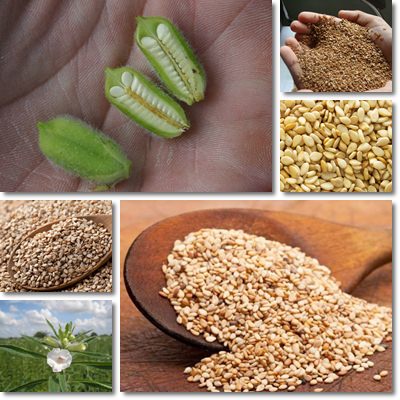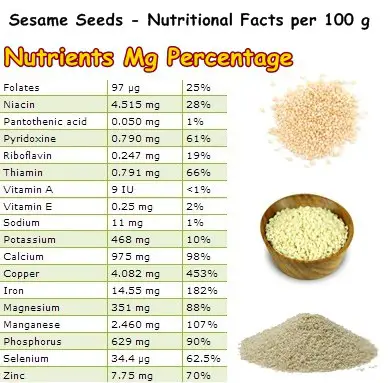Open sesame we say at the beginning of this article as we prepare ourselves to unravel the wonderful properties of the 3,000 year-old sesame seeds. Sesamum indicum, as it is best known in the scientific community, is an incredibly rich source of minerals such as calcium, copper, iron, magnesium, manganese and phosphorus. In addition to this, sesame seeds contain two unique substances with a great positive impact on our health, sesamin and sesamolin, as well as Omega-6 fatty acids with benefits for brain and skin.
Add to this a pleasant taste with light nutty flavors and a delicately sweet aroma and you have yourself the reason why sesame seeds are both sought after and healthy.
Even more, the seeds contain good amounts of protein and phytosterols, both with wonderful health effects. For example, a sufficient intake of protein helps build muscle, combat mood swings and reduce brain fog, while phytosterols have benefits for blood cholesterol levels. Overall, sesame seeds are without a doubt one of the healthiest foods in the world.
These plain seeds usually found on bagels and buns boast an outstanding nutritional value as well as provide several great health benefits, on the condition they are consumed with moderation, as part of an overall balanced and varied diet. But what makes sesame seeds so healthy? Let’s see.

What are the benefits of sesame seeds?
Source of sesamin and sesamolin
Sesaem seeds contain sesamin and sesamolin, two important phenols with beneficial effects on human health. Sesamin and sesamolin can be found both in sesame seeds and in sesame oil and are believed to help cure a variety of medical conditions. For instance, they help lower cholesterol levels and high blood pressure. Animal studies suggest that they can increase the absorption of vitamin E as well. More recent studies show that sesamin can protect the liver against free radical damage.
Extreme copper content
Sesame seeds are an incredibly rich source of copper. As a mineral of dietary importance, copper provides relief for people suffering from rheumatoid arthritis. Being a powerful anti-inflammatory (and antioxidant), it helps reduce swelling and pain symptoms associated with the condition. Moreover, it supports the activity of an enzyme called lysyl oxidase, which is responsible for collagen and elastin functionality. This basically means that the enzyme provides structure, strength and elasticity to blood vessels, joints, ligaments, skin and bones. 100 g of fresh sesame seeds provide about 435% of the recommended daily intake of copper.
High in iron, calcium, magnesium, zinc and manganese
Sesame seeds provide generous amounts of other minerals as well. Iron (182%) is recommended against anemia. Manganese (107%) has powerful antioxidant properties. Calcium (98%) helps strengthen bones. Magnesium (88%) not only supports the activity of muscles such as the heart, but also increases calcium absorption. Sesame seeds are a great source of zinc (70%), a mineral which stimulates immunity and helps reduce the severity of infections. I’d say sesame seeds are pretty amazing!

High B vitamin content
Other important nutrients found in sesame seeds include thiamine (vitamin B1), pyridoxine (vitamin B6), niacin (vitamin B3) and folate (vitamin B9). All of these B vitamins help the body metabolize carbohydrates, fats and proteins and convert them into energy. If you want to find out more about the functions of vitamins and minerals, about the best food sources of all of these nutrients and how you can identify any vitamin or mineral deficiency, see vitamins and minerals page.
Source of phytosterols for lowering cholesterol
Sesame seeds are also a good source of phytosterols, natural plant compounds famous for lowering cholesterol blood levels. The chemical structure of phytosterols resembles that of cholesterol. However, the former can actually reduce cholesterol, and thus prevent associated cardiovascular problems such as hypertension and atherosclerosis, improve the immune system’s response and possibly prevent some forms of cancer. For these reasons it is vital that we include in our diet fruits, vegetables, nuts and seeds, especially sesame seeds.

Rich in dietary fiber
Last but not least, sesame seeds are rich in fiber. 100 g of dried sesame seeds contains about 11.8 g of fiber, while 100 g of roasted and toasted sesame seeds provides up to 14 g of fiber (accounting for losses in water content due to heat processing).
What are the benefits of eating fiber-rich foods? First of all, dietary fiber helps lower blood cholesterol levels by reducing the intestinal absorption of fats from food.
Also, fiber helps improve transit time and increase the frequency of bowel movements. It has been shown that an adequate intake of dietary fiber from unprocessed plant foods can reduce risks of developing colon cancer.
Nuts, seeds and cereals are by far the best sources of dietary fiber. If you are struggling with constipation, you can try to introduce almonds, hazelnuts, sunflower seeds and sesame seeds into your diet. Overall, sesame seeds are a great source of minerals, vitamins, dietary fiber and bioactive components with a range of benefits for health. Among their most notable benefits, sesame seeds help lower blood cholesterol levels and lower risks of heart disease.
Sesame seed oil and flour
Sesame seed oil is rich in Omega-6 fatty acids which are essential for the good functioning of the nervous system and hold benefits for skin, hair and digestive system. Sesame flour is a great source of protein, as are sesame seeds (25% protein). Even more, they boast powerful antioxidant properties. Whether you prefer them roasted, toasted or dried, on a bagel or in a salad, sesame seeds should be part of you diet.
They bring such wonderful health benefits that it would be a shame not to take advantage of their high nutritional value.
Conclusion
If you’re not allergic to sesame seeds, in which case you should absolutely avoid them in all forms and preparations, then you’re free to enjoy all the benefits they have to offer. You can enjoy sesame seeds raw on salads, in baked goods or any Asian-style dish, or toast them for a more intense nutty taste and overall flavor profile and make them your new delicious and healthy midday snack along with apple slices for example. And here is something interesting: did you know that sesame seeds grow in a pod? And did you know that crops are so resilient that they can withstand both droughts and excess rainfall and can easily adapt to many soil types? Lastly, because they are one of the most common food allergens, if you have never eaten sesame seeds, oil or any sesame seed products before, it might be best to test for allergies first.
